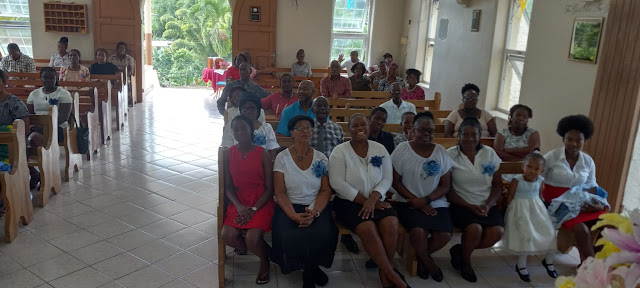A STORY TO BE MADE POSSIBLE! ORDINATION OF WOMEN IN SAMOA.
ü [Editorial Note: This is a beautiful prophetic piece about possibilities and a woman's dream to serve her Church with integrity long-term. It is also a story that has not yet come to pass. Our prayer is this: Grant wisdom and grace between people of goodwill, so that they might know how and when to act in service to You, dear God. Grant that there may be signs of encouragement for faithfulness and compassion when there is anxiety or struggle. Bring peace and blessing! Amen]
I wrote a story on the inadequate knowledge of our communities and churches on reading scriptures, not an excuse for women not to be ordained.
Titled
: Ordaining of Women is possible.
Once upon a time, in a
remote Pacific Island namely Samoa, a profound belief system governed the lives
of its people. This island nation had a rich cultural heritage, deeply rooted
in tradition and customs that had been passed down through generations.
Within this traditional
society, roles were clearly defined. Men were seen as leaders, decision makers
and spiritual guides of the community, while women were considered nurturers,
caregivers, and homemakers. The division of labor and social hierarchy seemed
unquestionable, and life carried on for generations in this manner.
Samoa had embraced
Christianity when missionaries arrived on their lands in 1830. The Christian
faith had blended with island’s customs and traditions, forming a unique
spiritual tapestry. The islanders worshipped God, following the teachings of
the Bible as interpreted by our ancestors.
As time went on, a
question began to rise among the younger generation. They wondered why women
couldn’t hold leadership positions within church. They saw their mothers,
sisters and aunties who were wise, compassionate, and knowledgeable being
excluded from the decision-making process within the church community.
Susana, a young woman
with a curious mind and a longing for change, started to explore this issue
further. She sought guidance from her grandmother, a respected elder in the
village, known for her wisdom and kindness.
Susana asked her
grandmother “why is it that women cannot be ordained in our church? Is there
any scriptural basis for this belief?”
Her grandmother paused
for a moment, taking in the seriousness of Susana’s question. She then answered
“My dear, our customs and beliefs have been passed down for generations, and
the elders have always taught us that men are the spiritual leaders. They point
to some verses in the Bible that they interpret as supporting this belief.”
Susana’s inquisitive
nature led her to study the Bible herself. She read the scriptures and
discovered that there were various interpretation of the passages cited to deny
women ordination. However, she also came across other passages that seemed to
suggest a more inclusive approach to spiritual leadership.
Susana at the time
recently graduated with a Diploma in Mission Studies from Trinity Methodist
Theological College in partnership with Council of
World Mission (CWM).
She was a representative
from her Congregational Christian Church of Samoa to join a Training in mission
program to enable the Youth to understand the Bible from different lenses and
able to do missionary work.
Susana engaged in a thoughtful
conversation with her peers, Bible Scholar lecturers, Theologians, female
Ministers from the Pacific and fellow Training in Mission participants from
other parts of the country to seek ideas on how she moves forward with the
journey in mind.
With her newfound
knowledge from this Training in Mission Program, she was encouraging her
family, church youth group, village communities, friends, and colleagues to
explore different interpretations of the scriptures.
Some were open to
reconsidering their perspectives while others clung tightly to the traditional
beliefs.
The issue sparked
discussions within the community and the divide between those supporting change
and those upholding tradition became more pronounced. Susana faced resistance
and criticism from some members of the community who felt threatened by the
idea of altering long-standing customs.
Despite the challenges,
Susana persisted. She organized workshops and seminars to facilitate open
dialogues on gender roles and spirituality. She encouraged men and women to
learn from each other and embrace the strengths that each gender brought to the
community.
Over time, more people
began to question the rigidity of the existing beliefs. Some prominent church
leaders listened to Susana’s arguments and engaged in theological reflections,
leading them to reconsider their stance on women’s ordination.
Eventually, the islanders
held a special gathering to address the issue. People from different villages
came together to discuss and debate. It was a momentous occasion, filled with
tension and hope for change.
After lengthy discussions
and prayerful considerations, a decision was reached. The community agreed to
move towards a more inclusive approach, allowing women to be ordained and hold
leadership positions within the church alongside men.
The journey had not been
easy, and there were still those who struggled to accept change fully. However,
Susana’s determination and willingness of the community to engage in meaningful
dialogue had opened doors to progress.
As the years passed, the
once divisive issue became a symbol of unity and growth for the people of
Samoa. Susana’s effort had sparked a broader conversation about gender equality
and representation in other aspects of society. The decision to ordain women
become a powerful catalyst for change and helped the island nation evolve into
a more inclusive and equitable society, embracing the strengths and talents of
both its male and female members.
And so, writing this
story teaches us that progress often comes from challenging deeply ingrained
beliefs, fostering open dialogues, and embracing the value of every individual,
regardless of gender. It reminds us that change is possible, even in the face
of strong resistance, and that the pursuit of justice and equality is a journey
worth embarking upon







Comments
Post a Comment